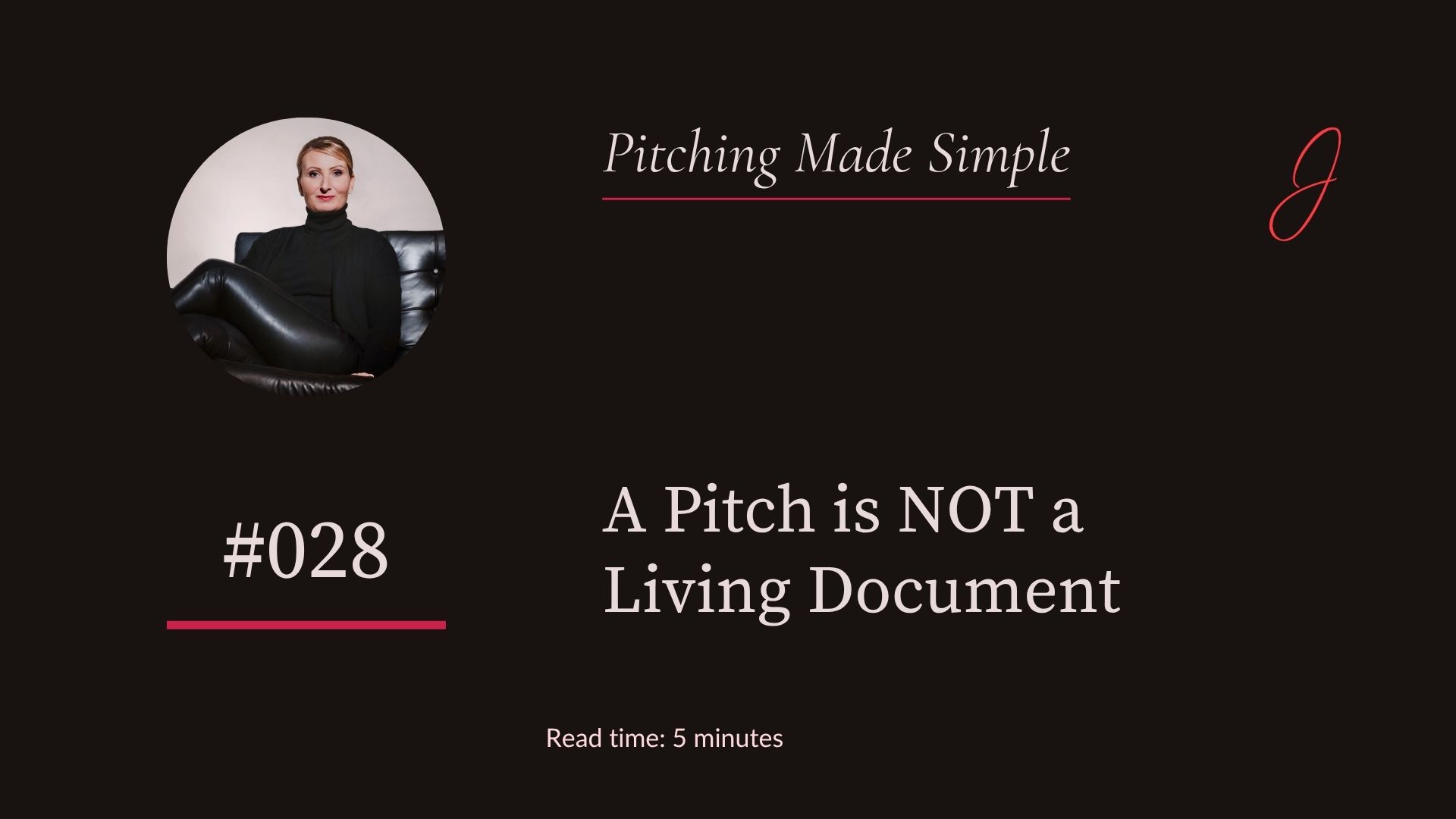#028 | A Pitch is NOT a Living Document

Todays newsletter is a bit longer than my usual ones, because I'm very passionate about it. Bare with me. It will save you a LOT of time later.
------------------------------------------------------------------
The other day, I sat down with a founder for a pitch coaching session. He showed up confident, leaned back, and said:
"I’ve got this covered. I’ve done this a few times, closed a round already. I’m no newbie. Our pitch is a living document - we’re always updating it.”
I stopped him.
“Why is it a living document?”
He blinked. “What?”
“Why do you keep changing it?”
He answered “ehhhh...we update after each feedback - isn't that good?”
Here’s the thing:
If your pitch was good enough to land the first meetings last time - and even close your round - why are you still redoing it?
This founder wasn’t unusual. I’ve seen it hundreds of times. Smart, capable founders constantly reshaping a pitch that already worked.
Why?
Because founders think iteration equals progress.
But a pitch isn’t a product. It’s not your MVP.
It’s your entry ticket. Your teaser. Your shot at a second date.
And if it’s already getting you in the door - stop reworking it. You’re not here to redo your pitch. You’re here to build a company!!!!
The Myth of the Ever-Evolving Pitch
Somewhere along the way, founders started treating their pitch like code: always pushing updates, patching bugs, and responding to “user feedback.”
One founder told me:
"We adapt our deck after every investor meeting -it’s how we improve."
Another said:
"Each investor is different, so we customize every time."
But here’s the problem:
-
You try to please one - how do you know that it will please the next one?
-
You try to please everyone and end up resonating with no one.
-
Your logic starts to fray.
-
The red thread vanishes.
-
The emotional arc breaks.
-
Your story feels disjointed.
-
The tone keeps shifting.
-
Your delivery gets shaky.
-
And worst of all - you stop believing in it.
Ever left a meeting thinking, “That didn’t sound like me”?
Or felt like you were pitching someone else’s company, not your own?
That’s the trap. Endless tweaking leads to pitch erosion - not pitch elevation.
Build It Once!
Here’s what actually works:
-
Craft a pitch that consistently gets first meetings. ( I call that the Perfect Pitch - you can read more about it here. )
-
Test it across a dozen rooms - not just one.
-
Lock it in. Own it. Deliver it with passion.
Here’s just a few examples of what I’ve seen first hand:
-
One founder that I worked with had a 85% hit rate of getting the second meeting. (For me that is definitely a Perfect Pitch nailing those numbers) So they kept the same pitch for two years, and raised €20 Million over that period.
-
Another founder of a scaleup had started to tailor their pitch after receiving constant feedback from investors and board members. After a while they realized they had lost the passion and suddenly they had such a hard time raising capital. We went back to the original pitch, tweaked it a bit and they then closed a €15 Million round in 6 weeks.
Why it worked?
Because they built a Perfect Pitch and then they stuck with it.
It worked because they didn’t try to mess with perfect.
Mastery doesn’t come from constant change. It comes from sticking with what works.
-
Pitches that stay consistent land more second meetings than those constantly edited.
-
Founders who lock the message come across as more prepared and conviction-led.
-
A cohesive narrative always outperforms a patchwork of “feedback-driven fixes.
-
Teams that use feedback to sharpen their answers, not rewrite their message stay confident and on-brand.
-
Real traction happens in the dialogue, or in the Q&A. The pitch is just the teaser.
And when you keep tweaking your pitch?
You're not iterating. You're stalling.
You should absolutely listen to investor feedback.
Just don’t confuse feedback with a to-do list.
What no one tells you:
-
That feedback came from one investor.
-
You need to get through many doors - so create one that does the job.
-
And a pitch that adapts to every single opinion belongs to no one.
The Bottom Line
A great pitch doesn’t evolve. It performs.
Your job is not to impress every investor.
Your job is to make them curious.
Your job is to get them to want the second meeting.
That’s it.
Ask yourself:
-
Am I changing this pitch because it’s broken - or because I think I always have to improve it?
-
Am I using feedback to evolve my delivery - or dismantle my story?
-
Am I chasing perfection - or just chasing approval?
You don’t win by having the most feedback-adapted pitch.
You win by having the pitch that gets you through the door.
Stop rewriting the teaser.
Start preparing for the conversation that comes after it.
Perfect that!
